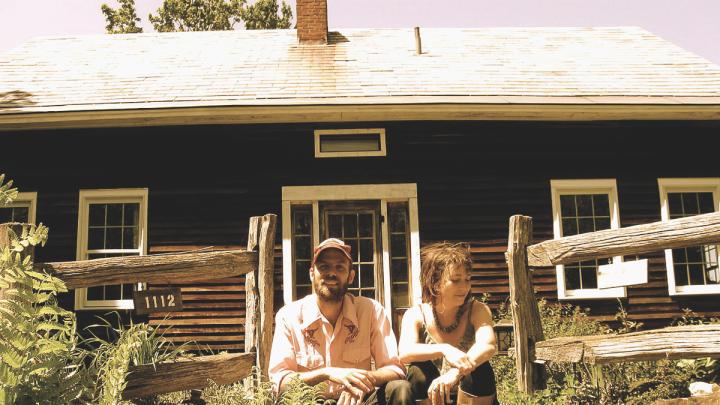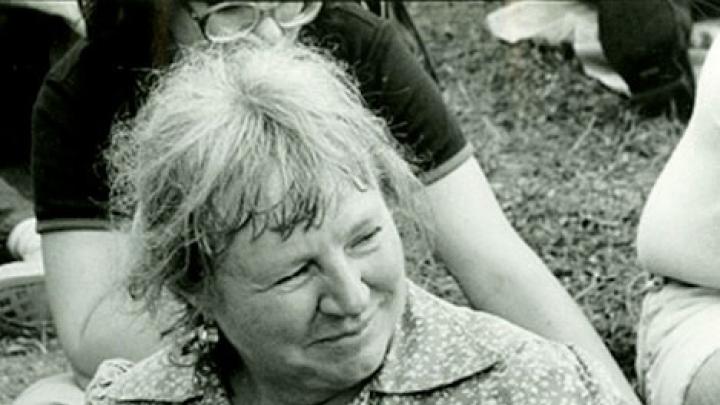The Green Mountain State does not leap to mind when the subject of indigenous American music comes up. Yet Vermont has bred American folk music, and your name in secret I would write (http://yournameinsecretiwouldwrite.blogspot.com), a recent CD produced, arranged, and performed by Tyler Gibbons ’99 and his wife, Robin MacArthur, collects some of its best. “Nowadays, when most people say ‘folk music,’ they mean acoustic-based singer-songwriter music,” Gibbons says. “But that really isn’t folk music. The old meaning of folk music is less about the individual and more about common themes. It was music meant to be passed on: the songs are a way of sharing stories.”
For example, the wintry “Stratton Mountain Tragedy” takes its story from an 1843 poem by Seba Smith about a real event from the late 1700s. The song tells of a young mother carrying her infant home through a nighttime mountain blizzard; the mother’s strength ebbs, and “She took a mantle from her breast/Bared her bosom to the storm/As round the babe she wrapped the vest/She smiled to think that it was warm.” The parent freezes to death in a snowdrift, but the infant survives; sung as a duet accompanied by plaintive, slow banjo chords and a drone note from a small pump organ, it makes an affecting musical tale. When the couple performed the song at their local historical society, in Marlboro, they learned that the mother who perished on Stratton Mountain lies in the town cemetery, and a female descendent places a red rose on her grave every Mother’s Day.
The sardonic “Single Again” offers a sharply different take on parenthood: a harried, married mother of three wishes in her heart she were single again: “When young men they first fall in love/It’s oh my little honey and my little turtle dove/But when they get married it’s no such thing/It’s get up and get the breakfast you cross ugly thing.” The song sounds Appalachian, and may have migrated to Vermont. Originally, “It’s fairly clear it came across from England,” says Gibbons, noting a reference to pounds sterling in the lyrics. Yet the song does not appear in any folk archive either in this country or Great Britain. “No one knows how it came here, or anything about it,” he explains. “There’s no record of it anywhere. We were excited to record it because that is a dying song—no one is performing it.”
Like all the songs on the CD, “Single Again” was collected by MacArthur’s grandmother, Margaret MacArthur (1928-2006), who in 1948 moved to an abandoned 1803 farmhouse in Marlboro with her husband, a professor at Marlboro College. With a Wollensak reel-to-reel tape recorder and children in tow, she began “seeking out folk songs that resided, near-forgotten, in the surrounding hills,” as her granddaughter Robin writes in the liner notes to your name in secret I would write. Margaret MacArthur performed the folk songs around the state, and in 1962 Moses Asch of Folkways Records heard her and asked that she send some of her music. “Surprised (and flattered),” the notes continue, “Margaret put some batteries into her Wollensak, sat down at the kitchen table after her children were asleep, and pressed record.” The album Folksongs of Vermont began a nine-record career.
In 2005, Gibbons and MacArthur formed Red Heart the Ticker, a two-person band (http://rhtt.net); they released two CDs of original music, For the Wicked (2005) and O My! Mountains Below (2008). In 2010 they set up a laptop and microphones in the very farmhouse room where Margaret had died and began re-recording some of her favorite songs with support from the Vermont Arts Council and the National Endowment for the Arts. “The idea was to take these songs and, while very much respecting them, take them into a post-folk or contemporary aesthetic,” Gibbons explains. “Margaret sang them with just guitar or dulcimer. We wanted to complicate them musically: in some songs we used electric guitar or bass, and a lot of percussion, which is not typical of how people performed these old ballads. Pure traditionalists would hate this album, because we didn’t handle the music with traditionalist gloves. Sometimes we would change the chord structure under melodies. We weren’t trying to recreate something that existed 100 years ago—we were filtering the songs through us, and our understanding of this place and time.”
The couple are native southern Vermonters—MacArthur from Marlboro, Gibbons from nearby Brattleboro—and have known each other since high school. MacArthur, a singer and guitarist, went to Brown and the two dated while Gibbons, at Harvard, studied the lyrics of Leonard Cohen and Bob Dylan (“I was real interested in how words and music fit together”) and played professionally on weekends as a bassist with the indie-rock band The Humming. “I find great inspiration in almost all genres of music,” Gibbons says. “Hip-hop is really interesting because it is so text- and word-based—literally eliminating the melody and reciting stories, which is much closer to these old ballads than a lot of other pop music. In fact, I was traveling once with Margaret and we were fiddling with the radio dial. This hip-hop song came on, and she loved it. She was listening to the lyrics and saying, ‘This is good, this is good.’ In a way you’d think it couldn’t be farther from the kind of music she was invested in, but in another way it made perfect sense: it was storytelling.”
 ">http://www.youtube.com/watch?v=G0HhUCHYOow&feature=youtu.be]










